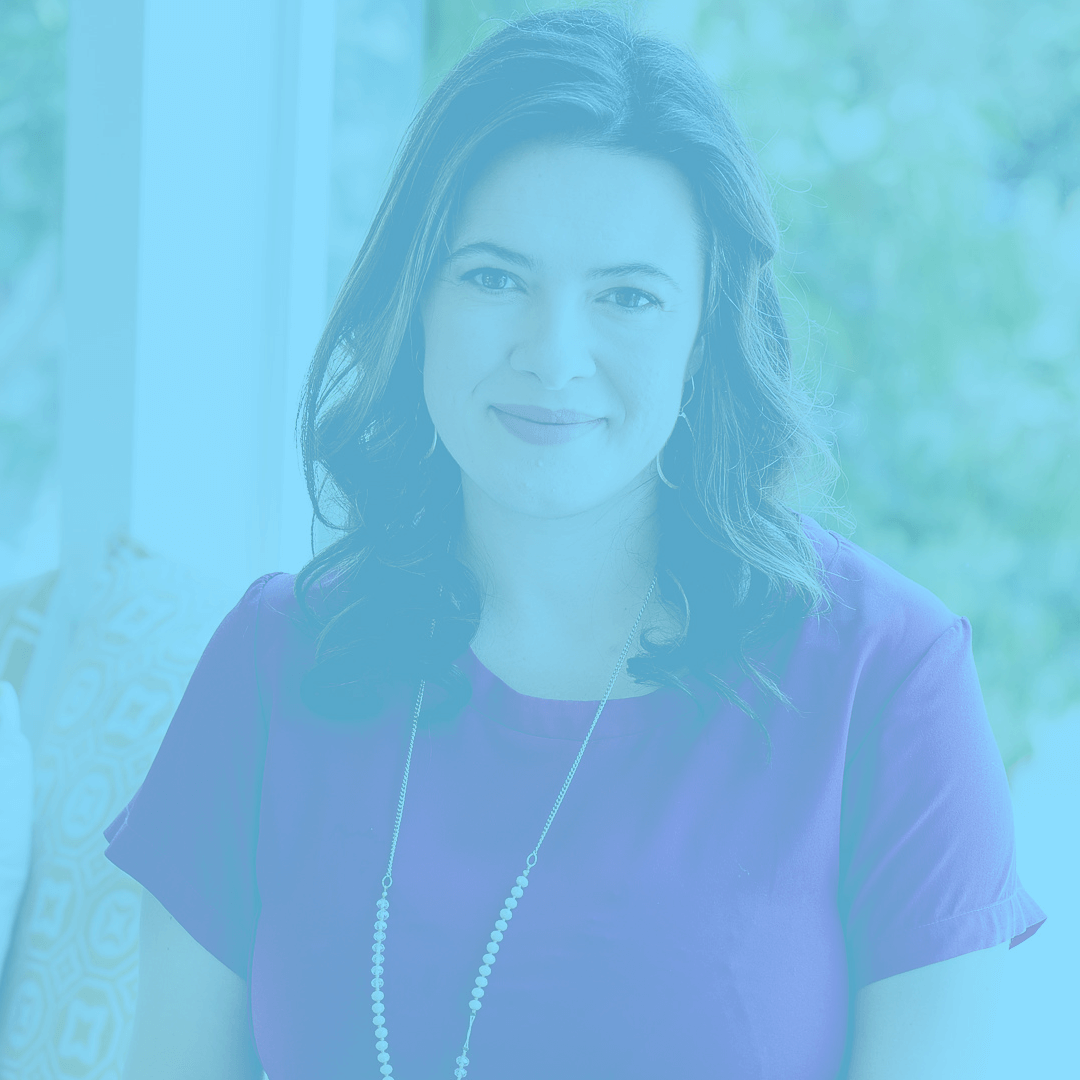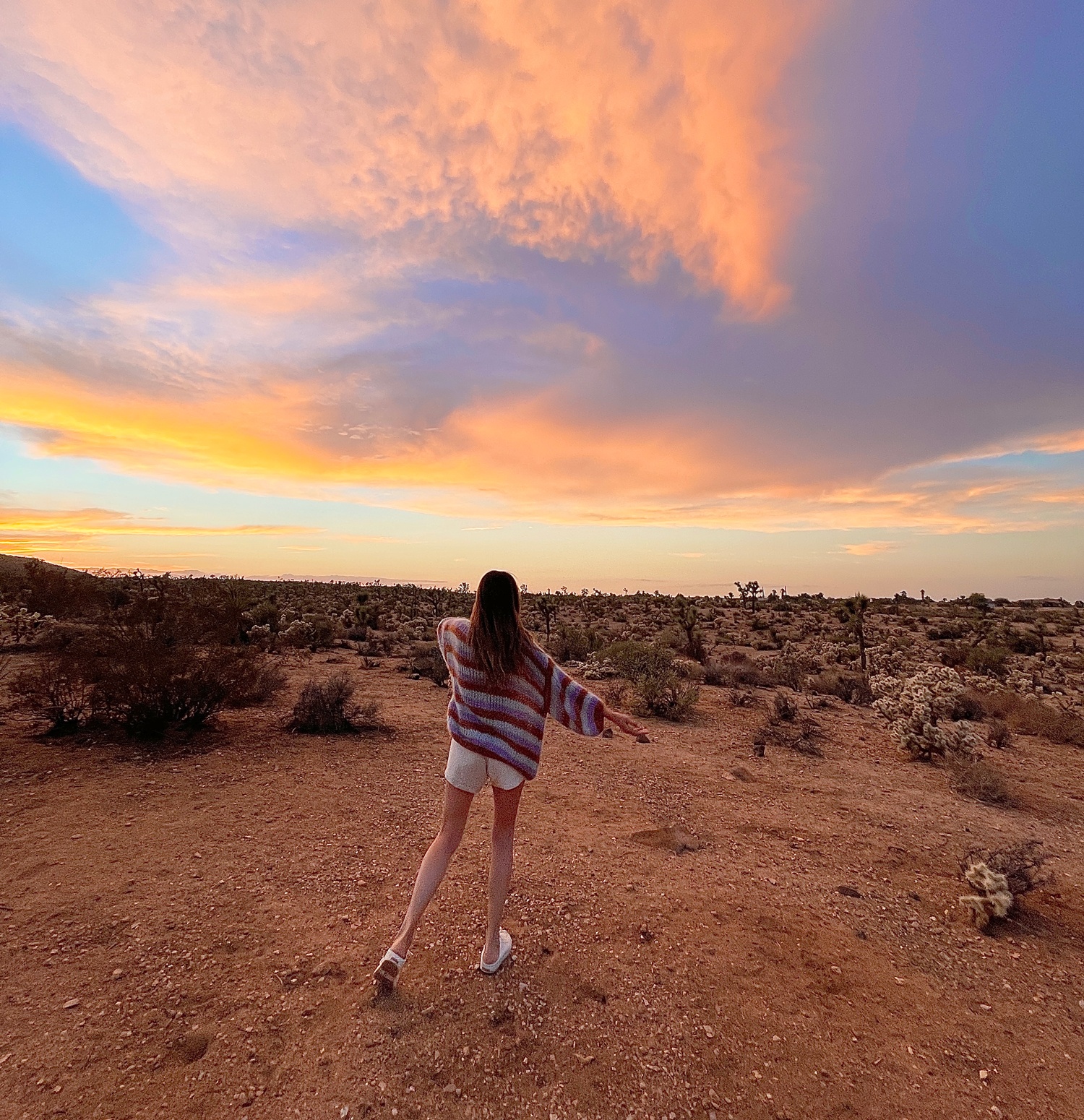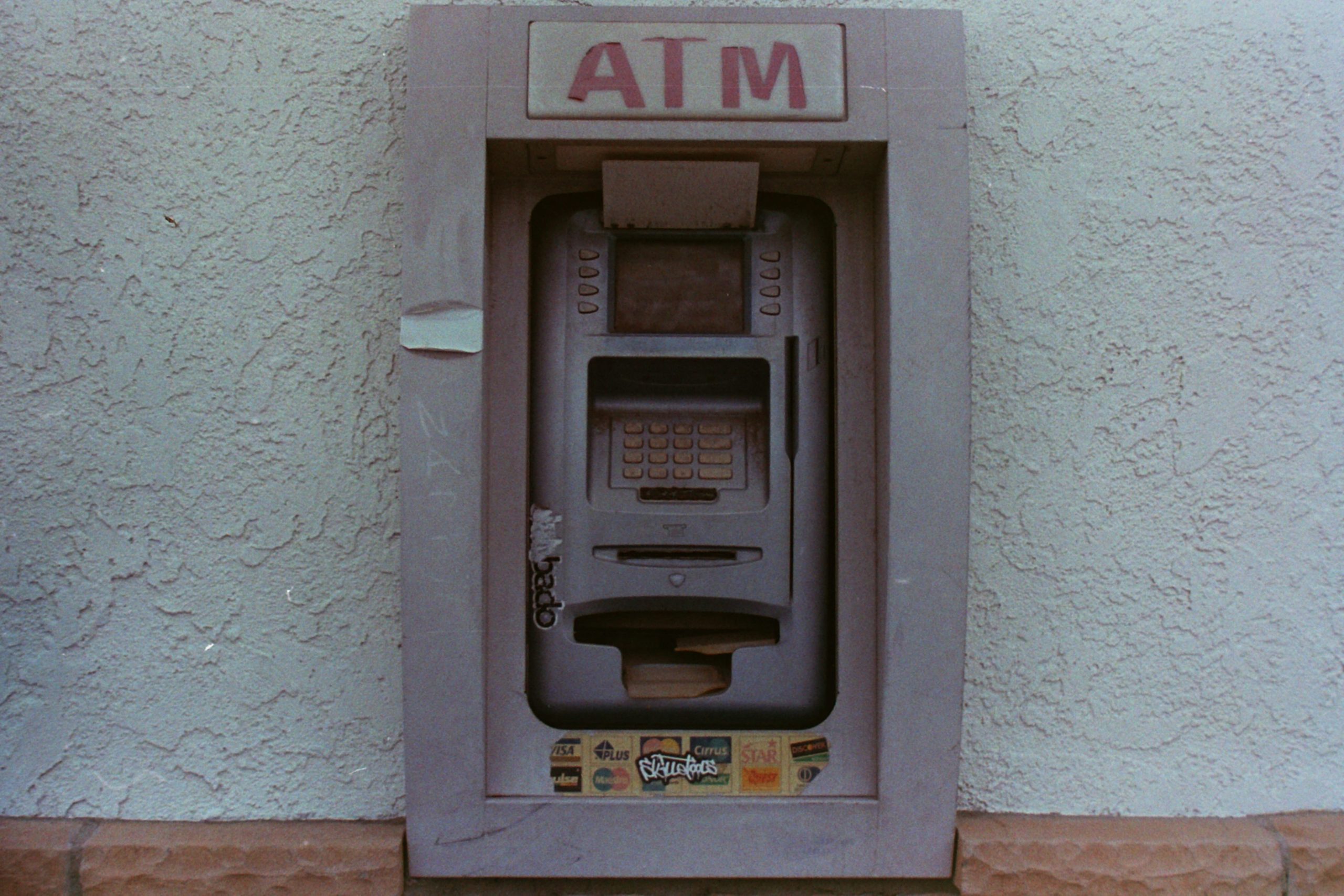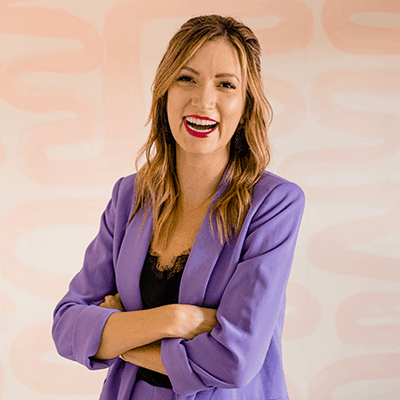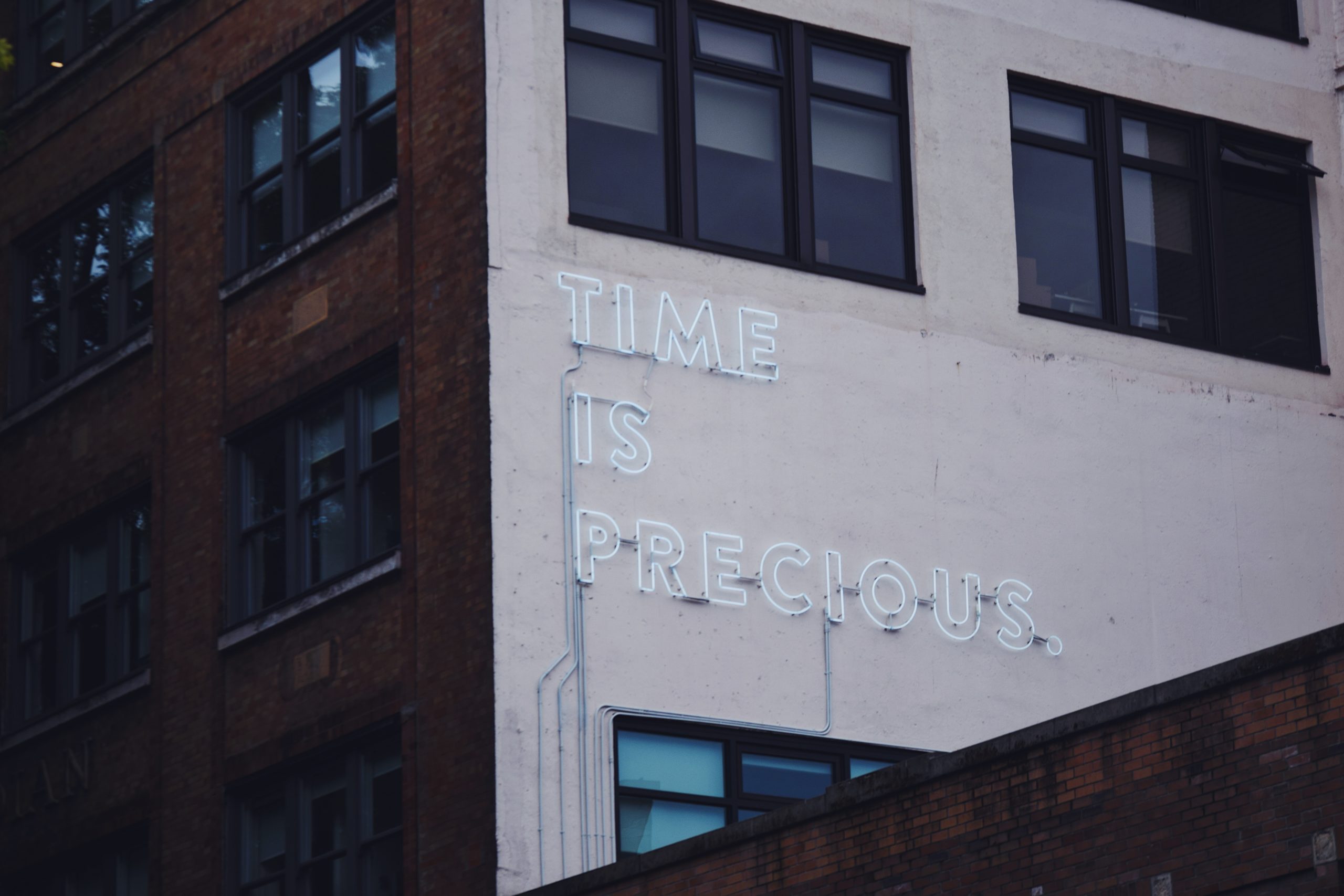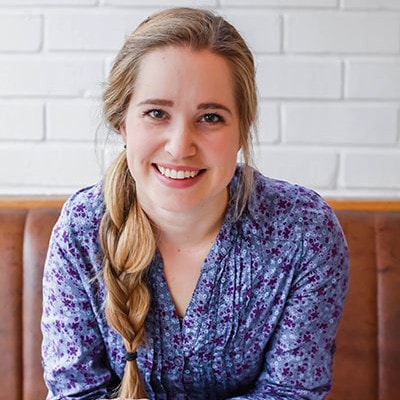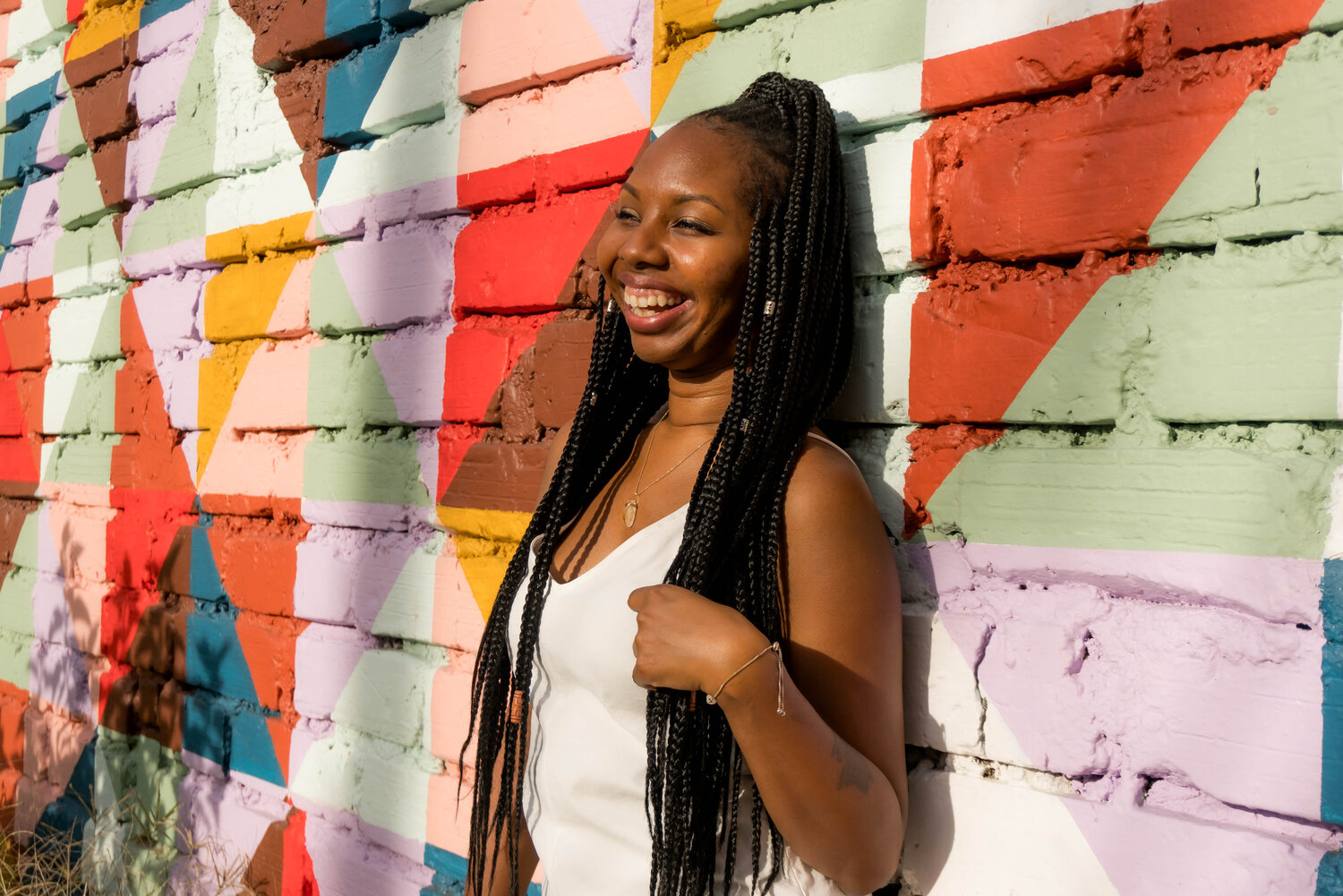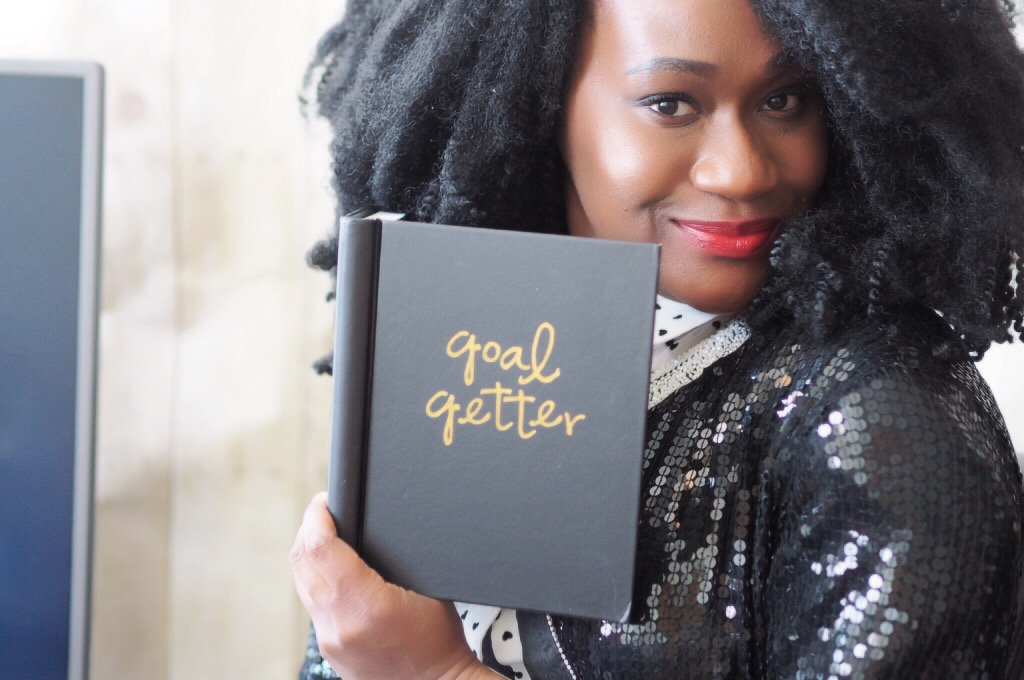A few months ago, someone on my team sent me a message raving about a book called Playing Big, by a woman named Tara Mohr. Not gonna lie, I had never heard of Tara, but I’m always looking for new book suggestions, so I went straight to Amazon to purchase her book. Two words: Mind blown.
Not only is Tara’s book well-written and eloquent, it is beyond fascinating and incredibly empowering – almost like she knew exactly how I was holding myself back. I definitely got the kick in the butt I needed to get rid of my limiting beliefs to play bigger in life.
Tara Mohr is an expert on women’s leadership and well-being, as well as an author, educator and certified coach. Her book Playing Big: Find Your Voice, Your Mission, Your Message was named a “Best Book of the Year” by Apple iBooks. She’s worked with major corporations like Google and Starbucks on leadership initiatives and her Playing Big concepts have also been incorporated into middle and high schools in the United States and United Kingdom to support girl’s leadership development.
During this episode, we dive into topics like how to access your inner mentor (trust me, you don’t wanna miss this), the ways that journaling can help you become your biggest self, how to update your beliefs so criticism just bounces right off of you, and soooo much more.
I can’t wait to see what you think. 🙂
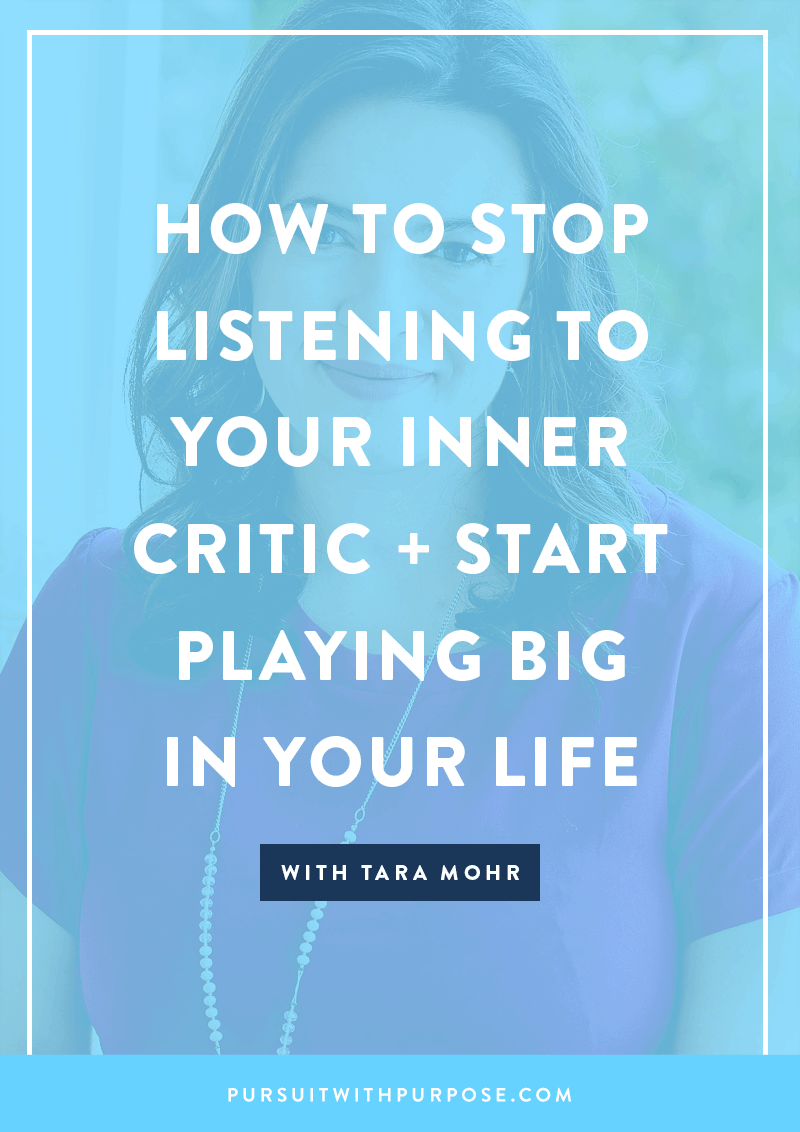
Check out the episode below:
In this episode, you’ll hear about things like…
- The two different ways our callings can show up and what Tara has learned about confidence as a result.
- How your inner mentor differs from your intuition.
- What “playing big” actually means, and why we stall our own ability to do it.
- The unique influence Tara’s parents had on her when she was growing up.
- Tips on how to journal more effectively to become your best self and go deeper into everything.
Some Questions I ask Tara…
- What are some ways that women can stop listening to their own self doubt to create the life they want?
- Why do you think journaling is so necessary as opposed to just thinking about how you feel, or even talking about your feelings with a friend?
- How do you think we stall our own ability to play big? What holds us back?
Links from the interview:
- Tara’s Website
- Playing Big: Find Your Voice, Your Mission, Your Message, by Tara Mohr
- Playing Big Course
- The Coaches Training Institute
- Inner Mentor Guided Visualization
What do you think?
I’d love to hear your thoughts on this episode. What does your inner critic tell you, and what do you want to claim in this moment?
Here’s how to subscribe + review
Want to be the first to know when new episodes are released? Click here to subscribe in iTunes!
Also, podcast reviews are pretty darn important to iTunes and the more reviews we receive, the more likely we’ll be able to get this podcast and message in front of more people (something about iTunes algorithms?). I’d be extremely grateful if you left a review right here letting me know your favorite part of this episode.
#PursuitWithPurpose
Loving the podcast? I encourage you to use the hashtag #PursuitWithPurpose to show our PWP tribe how you live your purpose everyday. Plus, you’ll get to sift through the hashtag to find other business owners who care about community and connectedness over competition and comparison. And I’ll be reposting some of my favorite images and stories, too. 🙂
Thank you for listening!
Transcript
Read the Interview Transcription HereHey, Pursuit with Purpose fam. So a few months ago, someone on my team sent me a message saying that she had just read an absolutely amazing book called “Playing Big” by a woman named Tara Mohr. Now I’d never heard of Tara and I’m always looking for new book suggestions, so I went straight to Amazon and they put in my order for her book. Now the book sat on my desk for honestly a few weeks before I finally decided to crack it open. Isn’t it always that way with new books? I need to get better at this. I have to tell you, when I first started reading it, I could not put it down. Not only is this book well written and eloquent, but it was also fascinating and empowering. It was like the author knew exactly how I was holding myself back and what I needed to do to get rid of my limiting beliefs and play bigger in my life. Now after reading the book, I decided to take a shot in the dark to see if the author, Tara Mohr, would be willing to chat with me on this podcast. I literally sent her invitation through the contact form on her website, and to my excitement and amazement, she agreed.
Now no matter who you are, you are going to absolutely love today’s conversation. If you identify as a woman, you’re going to love it even more. Tara Mohr is an expert on women’s leadership and well-being, as well as an author, educator and certified coach. Her book, “Playing Big: Practical Wisdom for Women Who Want to Speak Up, Create, and Lead” was named a best book of the year by Apple’s iBooks. Tara is also the creator of the Playing Big Leadership Program for women. Now her work has been featured in places you might be familiar with, like the Today Show and in publications ranging from the New York Times to Goop to Harvard Business Review. Now her incredible Playing Big framework has also been part of leadership development programs at Starbucks, Google, Bank of America and more. One of my favorite parts of her success, Tara’s Playing Big concepts have also been incorporated into middle and high schools in the US and the UK to support girls’ leadership development. I think that is freaking amazing. You can tell that Tara is an absolutely incredible human being. Now during this interview, Tara and I talk about things like how to access your wisest inner mentor, how journaling can help you become your biggest self, how to update your beliefs so that criticism just bounces right off of you, and so much more. I can’t wait to dig in. Let’s start the show.
Melyssa Griffin: Hey, Tara. Welcome to the show.
Tara Mohr: Thank you. Thanks so much for having me.
Melyssa Griffin: I am so excited. As I told you before we started the interview, someone on my team, Allison, read your book and recommended it to me. When I opened it up and started reading it, I was like I really want to have a conversation with her because this is so insightful and so needed, and so well written too. So really excited to share you with my tribe today and really just have a conversation.
Tara Mohr: Well I’m so glad. As I said to you, that was very serendipitous*, because I had come across your work and had just read some of your blog posts and found them really helpful. So I was so delighted when the invitation popped up in my inbox.
Melyssa Griffin: Yay! I love when that happens. So in your book, “Playing Big”, which is the book that I read and that we’re going to talk a lot about today, you talked about this unique influence that your parents had on you when you were growing up. Can you tell us a little bit more about that and their parenting style?
Tara Mohr: Sure. Well, I was very fortunate to grow up with a mom who—I called her a bedroom mystic. I called her that because her bedroom had floor to ceiling bookshelves and they were full of books from every religious tradition, every spiritual tradition, all different schools of psychology. That was her passion, learning about that. She wasn’t a therapist. She didn’t have the opportunity to pursue that as a profession, but it was her love. She also believed that you could begin talking about those things to a child at a very young age. So I can remember getting in the car after a tough day at kindergarten and saying, “I hate so and so because he teased me at recess.” She said, “Well, what do you think God thinks when God looks at so and so?” Or another day when I was complaining about someone, she said, “Well, what do you think is happening for them at home that would cause them to be mean to other kids?” She also analyzed my dreams every morning at the breakfast table. She’d say, “Did you have a dream?” And then she’d get out a yellow pad and we would diagram like the archetypes and the symbols. So there were so many gifts of that, but I think the kind of meta overarching gift was knowing that your inner life and how you work with yourself and manage yourself determines a lot of what happens in your outer life. It’s not just circumstance and it’s not just about kind of drive and achievement, that there’s this whole process of how we are with ourselves and how we can grow and evolve personally.
Melyssa Griffin: That is such a unique way of raising a child, that I wish more people adopt it. It’s like breeding this sense of self-awareness with kids and also helping them to become more aware of other people and where they’re coming from, why they’re behaving the way that they are. So it’s really unique and very inspiring to me, because for my future kids, I definitely gleaned some tips from your mom’s parenting style for things I want to try too. I’m curious for the way that your parents raised you with valuing things like intuition and psychology and understanding ourselves and other people, were there any downsides to being raised in that way that’s a little different from how other kids maybe were raised?
Tara Mohr: Well I do tease my mom about it now because I’ll sometimes say, “Yeah, but you forgot to tell me part two.” I can ask what’s happening for Johnny at home that is causing him to tease other kids and I can understand that and have compassion for that, but then how do I actually fight for myself on the playground? I think that they did forget that part. We can laugh about it now. I don’t think that that actually goes hand in hand with teaching your kids those things. I think that was more just about our family dynamics and sort of what was—there was comfort around and discomfort around in our family.
Melyssa Griffin: Yeah. Right. It’s so interesting. Did you ever find it difficult with other kids, kind of coming from this different place or maybe school being a little bit different in how it’s structured and the way that school makes you kind of trained to think a certain way?
Tara Mohr: So there was such a contrast between the ideas I was raised with and then the messages I was getting from school and from our culture. At home, it was everyone is a creation of the divine and everyone has unique gifts and you have unique gifts. But then how do you make sense of that if in school I was seeing kids ranked against each other and some kids in honors classes and some not, a very different paradigm? And then of course at home, I was also being taught that our intuition mattered and our unconscious minds mattered, our psychology is what drove our decisions. But then I couldn’t figure out like well, then why are we talking about how this war happened without talking about the child psychology of either of the presidents who started it. I still wonder why we’re not talking about that. So that was a tension for me. I think for a lot of us creative entrepreneurs, like your listeners, the things that can feel in conflict when we’re growing up, hopefully we find a way to blend them or bring them together. That’s the part of like the gift we can bring or the unique perspective we can bring as entrepreneurs. So for me, being both encouraged to do well in school but then being kind of taught a world view at home that didn’t match, now people say, “Well there’s this Tara person who is like a coach and write poetry and will talk to you about spirituality, but I like that she has an MBA from a traditional school.” So now it comes together for me. I think if we can trust that those things that we feel conflict about can do that, they can become really unique things that we bring.
Melyssa Griffin: Right. That’s such an interesting perspective. It seems like just the education system in general could benefit so much from having that kind of depth and perspective of self-awareness and understanding people, as the foundation of everything else that we learn.
Tara Mohr: Absolutely. There’s more of that happening. There’s mindfulness being taught in school. There’s yoga being taught to little kids. I think about with my son, I have a four year old now, and I’m like it’s impossible to avoid plots where there’s a bad guy, and yet my view is that there is no bad guy and that that’s a myth. Someone only looks like the bad guy from afar. Someone only looks like the bad guy when you don’t understand the hurt that is causing their actions. And so our cultural stories perpetuate that myth that there’s a good guy and a bad guy and the job is to beat the bad guy.
Melyssa Griffin: So when did your journey of helping women to play bigger in their lives really start for you?
Tara Mohr: Probably started in the womb. But I do remember in childhood, starting to notice why are there no women up in front of the congregation at religious services, why are we not learning about any women in history class. Surely they were there in the 1700s too, could we mention one of them? Why aren’t we reading any books by women in English class? Why are there not very many women in our government? Noticing and being very attuned to how women’s voices were missing. I think that the areas of black in the world or need in the world that we each notice, really do point us to our calling. For me, I was just constantly seeing that. It was like a flashing light for me and it really pained me personally. I always felt like somehow my—like I got a boost of energy and passion to do something about that every time I saw one of those places that women’s voices were missing. From a very young age, to the point where at 15 years old, I went to my English teacher and said, “come on, there’s no women authors in our whole English class curriculum”, and worked really hard to raise money to buy books so there would be. So it’s been a long, long running passion for me that I’ve worked on in a lot of different ways. Although I have a great deal of passion for women fighting the external barriers, what I found when I came into the working world, was that I and all of my peers and my colleagues were battling the internal barriers, the conditioning* we had as girls to not rock the boat, be nice to everybody, not ask for too much, not ever appear arrogant, all that stuff. And also, we were trying to make sense of like how do we fulfill our dreams in a world that tends to really be quite critical of women when they are speaking up and not really welcome women who are stepping forward into leadership. So that became the focus of my work, is that inner side of what does it take for us to kind of unlearn the historical legacy and really claim what we can claim in this moment.
Melyssa Griffin: Yeah, I love that and I have a question about that in a second. I also love something that you said in there, which was if you keep seeing something everywhere, then that is your calling. I think that’s such a beautiful prescription for people who are looking for their calling in life. If there’s something, an issue, value that you notice everywhere, then that is probably the thing that you are meant to be doing.
Tara Mohr: Yeah, I think our callings can show up in two different ways, and I talk about this in the book. It’s really nice when they show up as a vision of what you want to create, like oh I’m seeing this amazing business, or this artistic project, or I can picture the community organization I want to start. That’s lovely, but sometimes our callings do show up on kind of the other darker side of the coin of I’m feeling a persistent pain about this issue or this aspect of the status quo. I think that’s just as important to pay attention to for sure. We all read lots of disturbing news headlines every day, and yet, there will be certain pieces, certain issues or a particular story that keeps you up at night. So why? That’s important. It’s important to pay attention to.
Melyssa Griffin: Paying attention to where you’re just feeling a lack of ease, it sounds like, in your thought process or your life and figuring out where is that coming from and why is it there. So one thing that you said, kind of going off of what you were talking about earlier, in your book, you said this quote that “At both Yale and Stanford, I saw very clearly that it’s simply not enough for institutions created by and for men to open their doors to women. Much more needs to change; the norms, the practices and the face of its leadership, to create a place where women can truly succeed.” I underlined that part of the book because I thought it was just so right on. You’re basically saying that women might have more rights than they did before, but just adding more rights to their bill doesn’t mean that society is set up in a way that it benefits and honors women. So I’d love to hear more of your thoughts on that and what you think it takes to shift that.
Tara Mohr: Yeah. Well for example, I’ll take the case of Yale, which I don’t think growing up, anyone really talked to me about the fact that lots of the colleges that I was applying to or that my peers were going to, hadn’t been coed for very long. I don’t think I knew that. I was raised, as many of us were, of like isn’t this great, you were born after 1970s feminism. So everything’s been set up well for you. Go ahead. Compete. Play in the game. Play in the sandbox. And so because no one talks about that, I just kind of walked into college like here it is, it’s here for all of us, boys and girls. Then I looked around the walls and the walls were full of these huge portraits of old white men, all the founding fathers of the school and the deans and whatever. Never a person of color. Never a woman. 90% of the tenured professors when I was at Yale, were male. I was an English major. You couldn’t even get to a book written by a woman until like the third year when you were like—it was time for electives. And so there were all these ways where that’s not an egalitarian environment. You just can’t tell—you can’t convince me that male and female students are going to thrive equally if all the material they’re working on was created by men with a patriarchal world view or that women and men are going to thrive equally if some of them can see role models in their professors and some of them can’t, but they can identify with in that kind of way that, gender central to our identity.
We know now, now there are so many amazing studies on unconscious bias and stereotype threat, that show these simple, small cues. I mean the cues I’m talking about are pretty prominent, but even as small a cue as if African-American students are taking an academic test and there’s a picture of Obama on the wall, they will perform much better on the test, if a female student is asked her gender like on a form before she takes a math test, she’ll perform worse because she is being reminded of the fact that she’s female and she’s been conditioned to think that she’s not good at math. So you can’t say that just because the doors have been open to women, everything is equal for everyone. I think that’s super exciting to think about. The exciting part to me is to think about like—so then what is really an egalitarian environment, what does it need to look like to really create an environment where women are going to feel this is a place for me to thrive as much as the male students are. That’s what we need to create.
Melyssa Griffin: Yeah. What are some of the solutions—maybe even, you talked about the educational system. I’d love to hear your thoughts there, and then also maybe for entrepreneurs who want to create more of a society that is set up for women, not just women going into a male dominated society, but it is actually an equal place. So what are your thoughts there on solutions that we can do and that also society needs to work on in general?
Tara Mohr: Yeah. I think there are a lot of different pieces and the solutions are a little bit different of course, depending on the environment. A big piece is sort of who do you see and what do you see. So are the people in authority, whether that is the executive team in a company, or the professors in front of a class, or maybe the mentors you’re exposing yourself to, the teachers you’re exposing yourself to as an entrepreneur, do those people reflect your identity in some way? That’s going to affect how you see yourself. Another piece is sort of the body of knowledge that you’re learning. Is it coming from a perspective that, in the case of women, is it coming from a patriarchal perspective? So a second piece is actually about the knowledge, the kind of domain of knowledge that you’re learning. So for example, it always drives me crazy when people say female students aren’t performing as well as male students in math or engineering or science. Not only do they have these other issues of they’ve been socialized to believe they’re not as good as those things, maybe all their professors are male, they’re a small minority of the students in the classroom. We know that that affects their performance. On top of that, the body of knowledge they’re learning, like the field of engineering or the field of chemistry or whatever it is, we think that’s kind of just the objective, that’s the information, but that information is being shaped in a certain way and framed in a certain way. If it’s been entirely developed by men, it’s unlikely to resonate a sort of women’s way of seeing thinking, communicating.
We actually have a couple women in my Playing Big course right now. It so happens we have two professors of engineering in my course, who are both looking at how engineering education itself is sort of structured to work for white men. There are sort of ways of communicating and cultural values that if you frame the information differently, it’s a different learning experience for people. So I think entrepreneurs can look at that. Does the body of knowledge I’m learning and the content I’m learning, does it reflect a perspective that feels like mine? Your journey is interesting. I am curious if you feel like—because I know you have made a shift into thinking more about fulfillment and purpose, which is something that, in a way, I would say a feminine perspective or women have had a lot more our permission to make that central to their work. It tends to be a lot more central to how we think about our work. A lot of that tactical knowledge comes out of like a very kind of patriarchal frame for looking at the world.
Melyssa Griffin: Right. Yeah, I definitely went through that. I feel like the business world, if you’re not super clear on your purpose or your why, it’s very easy to get wrapped up in the more aggressive, tactical, do all the things, compete, compare mindset. I noticed that I had been doing that for at least a year inside my business. I was getting good results externally, but internally, I just felt horrible. It just didn’t feel—it felt like I was living up to somebody else’s vision of what success looks like rather than describing and understanding what success felt like inside for me. So I definitely did make that switch of figuring out what do I actually want to create in the world and for myself versus just chasing something because that’s kind of what we’ve been taught to think we should be chasing. So I love that you brought that up. You also share this exercise, and actually a lot of exercises and tips in your book, about how to stop listening to your inner critic. What are some ways that women can stop listening to their own self-doubt in order to create the life that they want?
Tara Mohr: Yeah. Well I think the first thing is to really hear the perfect nuance of how you’re asking the question, which is the name of the game is not how can we stop having an inner critic or how do we get rid of our inner critic. That’s not it. A lot of times, the advice, particularly the advice that women get, is around how to be more confident, which is kind of a macho thing in itself, like the idea here is to puff up and not feel, not be in touch with any sense of self-doubt or aware of potential deficits. What I have learned over the past 10 years working with women around their career dreams is that confidence isn’t coming. That’s kind of the bad news, but it’s also the good news, because if it’s not coming, you don’t have to wait on it. So if anyone listening is like I’m going to do this certification and then I will feel confident to do X, or after I have a few more years of experience, then I will be able to confidently submit my TED talk, or then I’ll be able to confidently launch a course. I’m here to say no. Unfortunately, what happens is when we are doing something that feels emotionally vulnerable because it brings up the risk of failure, or it’s new, or there’s an uncertain outcome, or other people might criticize it, our safety instinct does not like that. It’s going to do everything it can to try and get us to not go for that risk. One of it’s favorite strategies is the inner critic.
So in my view, the inner critic is always like a costume that your safety instinct has put on, because rather than saying “hi, I’m your safety instinct, don’t do anything interesting, exciting, fun or that could bring change in your life”, it says you’re not qualified for that, you don’t have what it takes, a million other people are doing that, you’re not enough of an expert—all those things. And so we have to learn how to not listen to it. The tools for that are about noticing when you’re hearing your inner critic, simply naming it: “Oh, hi, I’m hearing my inner critic right now.” That’s a huge piece of work for most of us to just start to have that awareness. And then sometimes that’s all we need to do. Sometimes we can do a little more, kind of add a second tool to that of either seeing a character for the inner critic and personifying it which can add some humor or looking at what’s the protective fear motivation of the inner critic and having some compassion for that. It’s always a moment to moment practice of you can be here and I’m not going to listen to you.
Melyssa Griffin: Yeah. I liked, kind of you touched on this, but I liked in the book where you said to think of your inner critic as a small child who’s really just dictating what you should and shouldn’t do, and being able to talk to that small child inner critic in a really compassionate way, where it wasn’t like, “Hey, inner critic. Shut up. You suck.” It was like, “Hey, I hear where you’re coming from and I understand.” You say it in a loving way and you tell them, “But you know what, I got this and I’m going to do my own thing.” I thought that was really beautiful too, to really see it with more compassion rather than just thinking of it as this terrible thing that exists inside of us.
Tara Mohr: Right. Yeah. I mean I think that we could probably say that goes back to my mom saying, “What’s going on for so and so at home that would cause them to do that?” Why is this voice lashing out? There’s always fear there? It’s like if it’s saying you look horrible in that dress and you need to lose 20 pounds before you go to that party or go on that date or go on TV, underneath that is enter* I don’t like the awkward moments at the party, I don’t want to go on a date and feel again really disappointed if it doesn’t work out, I don’t want to go on TV and then have to watch a video that makes me cringe because I’m going to feel I didn’t do a good enough job. There’s always real fears and concerns under it. We can proceed with real caution and then let that have it’s place, but we don’t want that voice running the show of course.
Melyssa Griffin: Right. I love that, that it’s not about completely getting rid of it, it’s just honoring it and choosing to do something different. That’s awesome. So you also have an exercise kind of going off of that, that you do with your clients, which helps them identify their inner mentor, as you call it. How does that exercise work? It sounded very intriguing to me in the book.
Tara Mohr: Yeah. This comes from CTI, the Coaches Training Institute, where I did my coaching training. It’s a guided visualization or meditation that the full form of it takes about 15 or 20 minutes to do. We can give people a link to that, but everyone can kind of do a quick mini form of it now. The idea is just that you close your eyes, take a couple deep breaths, relax for a minute, and just call to mind a picture of yourself, a sense of yourself 20 or 30 years out into the future; a person you have grown into. You can get a sense of that being’s presence. And then if there’s a dilemma in your life right now or question in your life, you can pose it to them and ask them what’s their perspective on it. I’ll just say this tool, I have just—I watch it again and again. People can really access a totally different perspective than how they were thinking about something before. Often, people will be stuck in an A or B: do I stay in my job and suck it up or do I take the big leap and make a financial risk? Do I do this thing in my business that I don’t feel good about or this thing that I don’t feel good about for some other reason? Whenever they’re stuck in an A and a B, they go to their inner mentor: should I do A or B, and stuck. The inner mentor is like, “Well, you should do C.” C is like, oh C, C feels so good. And so some people may have just, right now, like already kind of clicked in. If you didn’t, that’s totally okay. That’s what that longer visualization is there for. It’s just such a powerful tool. I think it’s really powerful for everyone. I would say for women in particular, we’ve just gotten obsessed with this idea of like as long as women find great other women mentors, that’s going to fix all of our gender and leadership problems. It’s not working out that way. We actually need way more encouragement for women, for them to trust themselves, not go find one more source of advice. So I love this tool specifically for women for that reason too.
Melyssa Griffin: I love that last piece that you mentioned. It seems like it really helps women to hone in on their intuition and really listen to, like you said, the inner guidance that we all have. For whatever reason, it sometimes can feel hard to access that. I’m curious, for any woman that does feel like that, who’s listening right now or maybe even a man who’s listening, and who maybe uses logic and critical thinking all day at their jobs or in school, and they’ve kind of pushed their intuition away and they don’t really use it all that often. How do you recommend accessing that intuition more? Is it using the inner mentor? Is there anything else that we should keep our eyes or hearts open to?
Tara Mohr: Right. Yeah, I think—so intuition, I find intuition really confusing as a term and a concept. The more we learn about kind of the biology of what we’re talking about and the psychology of what we’re talking about with intuition, it is very confusing, because what intuition really is, it’s like when you have a knowing or belief that is not based on the sort of consciously perceivable evidence. So sometimes that’s like a graced thought. Sometimes that’s your inner wisdom. Sometimes it’s conditioning from a bunch of stories that you grew up with, that you don’t really want to repeat. Sometimes that’s where bias comes in. It’s that intuitive hit of like that person, I’m feeling—at an intuitive gut level, I’m feeling scared about. Well, that’s a lot of times where racial bias, for example, shows up for people. So there’s like all these things that we’re lumping into intuition. And so I think that’s part of why it’s dicey as you’re saying. Also, the part of intuition we want to access, can be really hard to access. The inner mentor I find to be a much more reliable tool for getting to the wise self, the calm self, the self that’s really in touch with the kind of our centered truths for our lives and the path that we’re being called toward. I really like this term, this classical term that Aristotle coined, “intelleki”. The definition is, it’s the process of something becoming itself. I love that idea, that we all need to be in a process to become ourselves.
So inner mentor to me is a tool for that, or as Joseph Campbell talked about, what’s the oak tree that your acorn is trying to grow into. The blueprint is there, but you’re not there yet. It helps us see that. It also is—it brings us into the realm of symbols. So a lot of times when people do the inner mentor visualization, they’re like, “Well she lived at the beach. Why did she live at the beach? I’m not planning on living at the beach?” The point is not that you’re going to live at a beach in 20 years, but it’s like what is the beach a symbol of for you, what energy, what way of being, and what does that tell you about what your authentic self wants to live out right now. So it brings in a lot of symbolism and visuals that’s just as powerful and important as anything your inner mentor says.
And then the last thing I’ll say in answer, just in terms of your question is, I have been surprised like I had my stereotypes of like who can I use this tool with, who can I not use this tool… I remember one time I was doing a workshop for a really big bank, like a corporate workshop. I’m like well it’s a bank and we’re going to do some stuff on feedback, and we’ll do some stuff on inner critic. We had worked out the whole agenda. The night before the organizers called me, they were like, “We’re just so disappointed that you’re not doing inner mentor with us. Why you’re not doing inner mentor with us?” I was like, “Well, because I didn’t think I should have everyone lie down on the floor in your corporate ballroom and do a 20 visualization. Would you really want to do that?” They didn’t lie down on the floor, but there were a couple hundred people who work at a bank, and this is their professional development day. I’ll tell you, when I did that visualization, I don’t think I’ve ever done it in a space where the group brought so much stillness and sacredness. You could have heard a pin drop. Most of the room was crying. People made the most of that opportunity. So there’s nobody who can’t access it. That’s what makes it a great tool.
Melyssa Griffin: Yeah. Wow, I love everything you just said. So much to unpack there. Just going off of the last thing that you talked about with the bank and doing that exercise with them. It seems like we all have those moments of nobody’s going to like this, this isn’t going to be worth it. And then you get there and it’s like oh, these people who I thought were going to hate this thing that I love doing, actually got more out of it than anyone else that I’ve ever done it for. So I think that’s such an interesting point that’s so at the core of everything that you teach too. I thought it was interesting too when you were talking about like what does the ocean symbolize and what do all these little things that your inner mentor, this higher self, your older future self has, what do they represent. It reminded me of your dream interpretations. It’s so interesting how—to see just how your childhood and all this, the things that your parents did really come together for you. I had never thought—I like the distinction between inner mentor and intuition because I’d never thought about how intuition could impact things like racial bias and how our gut feelings can also come from a place of judgement, rather than deeper intuition. I really like that distinction and thinking more of our intuition and inner mentors like this higher self, rather than just this gut reaction that we might have to something. That’s really interesting. You also, in your book, mentioned that journaling is a tool for playing bigger because it allows us to really know what we’re thinking and feeling deep down. So why do you think that journaling is so necessary versus things like thinking or talking to a friend about how you feel?
Tara Mohr: Well I’m definitely not a huge fan of thinking.
Melyssa Griffin: I can tell.
Tara Mohr: …come out after all my education and degree, is not really that much of a fan of thinking. I’m kind of joking but not really, because what I notice with thinking, is that a lot of us loop in our thinking. We are not actually moving forward. We might be looping in the same worries. I’m not a big fan of the phrase “figure it out”, because it’s like really think for a minute, for people listening. The most important things in your life, have you “figured them out”? Did you ever figure them out? Is that how they got resolved? For me, I would say the important things, I never figured them out. Maybe I experimented my way in action to seeing the answer. Maybe I found an answer through a conversation with my inner mentor. Maybe I had to really feel in my body like does this possibility—nope, that feels tense and off. That possibility allows me to take a deep breath. I never figured anything out important, honestly, in my life. So that kind of thinking, I think there’s a place for thinking, obviously. I like editing my writing and getting all into my left brain about making the order right. I like structuring great curriculum. I like doing research. I like making a strong argument. I think we’ve really let thinking magnify way beyond its place in the broader ecosystem of ways of being, ways of getting things done, ways of discerning. So yeah, I do like talking, but I think it has to be the right conversation. Obviously, I’m a big fan of coaching conversations*. You put down a thought, maybe you put down* it a few times, but then you don’t really put it down the seventh time. The seventh time, your being goes to the next level of the deeper thing to say there or the feeling that’s really at the kernel of it, or the question you need to ask, or the new insight. It takes us somewhere. We also know there’s a lot of—there’s a lot of great research about journaling and how it helps wellbeing, but also that when you give language to a feeling, it immediately decreases the intensity of the feeling. It’s sort of like you’re taking that more intense emotional part of the brain and linking it to the language part, and kind of helping you regulate. So I think that can be really powerful as well.
Melyssa Griffin: Very interesting. I found over the past year, I’ve adopted my own practice for journaling. I just see it as one of the most transformative things that I’ve ever done for myself. Just every morning or sometimes it gets pushed to the evening, but every day journaling a few pages about just whatever comes up for me, and seeing where that takes me and helping that to give me more awareness about myself and my life. It’s been a really profound experience. Are there any…
Tara Mohr: And it’s so simple and it’s free.
Melyssa Griffin: Yes, I know. I feel like the best things that we can do for ourselves oftentimes are free. Are there any specific journaling habits that you recommend, like a certain number of pages or a time of day or anything in particular that you suggest there?
Tara Mohr: Yeah, well a couple things I learned from Jen Louden, who is another wonderful author and an entrepreneur, and who has wonderful writing courses and retreats—she taught me when you’re writing for yourself, just let yourself go, don’t edit, don’t worry about punctuation, don’t worry about sentence structure. Get it out on the page and also don’t let your pen stop moving. So if you feel like I’m done with the topic or I don’t like this anymore or I have nothing else to say, don’t put your pen down. Just write, like I’m feeling really annoyed at the topic now. I have nothing else to say. I’m done with this. You might even write five times: I’ve nothing else to say, I’ve nothing else to say, I’ve nothing else to say. If you keep your pen moving, you’re sort of staying open. I see it as like a plateau of like the writing is taking you deeper and deeper and deeper, and then you hit a plateau. You might stay here, but if you keep your pen moving for a minute, you get to go down to the next level of depth and insight. So those were really useful lessons that I got from her. I also think I would apply some coaching rules to journaling prompts. So for example, don’t ask yourself either/or questions because that’s too narrow. Prompt yourself with open ended questions. In other words, don’t ask should I stay or should I go. Ask what’s the right next step. And then kind of keep your prompts really simple for yourself. I think great coaching questions are always no more than seven words. The same I would say is true for journaling prompt, it’s like get to the elemental; what am I feeling now, what feels important, what do I really want—kinds of really basic questions. Open ended questions I think are great ways to get going.
Melyssa Griffin: I like that. In your book, I noticed you have a lot of journaling questions which I thought* were super valuable too. One thing that I do when I journal, and I’m going to adopt your practices that you just talked too, is I try to write at least three pages. It’s a very similar reason behind doing that as to what you were talking about, with keep your pen moving, because the first page, maybe the second page, I’m talking about surface stuff, what I did today, the basics. And then by the third page, I’m getting more to the core of I have nothing else to say on the basic, random stuff, now I’m getting the core of how I felt, why I felt that way, and having more awareness about who I am. So I like that addition of never stop your pen from writing and just keep going, because that’s where the deeper layers will start to come out, I love that. So how do you think we stall our own ability to play big? What do you feel like is at the core of what holds us back?
Tara Mohr: Well, I think there’s sort of a universal core and then a core for kind of layered on top of that core that I see affecting women in particular. I guess first, it’s important to say what playing big is. So my definition of playing big is it’s being more loyal to your dreams than to your fears. Going back to that kind of there’s your acorn and oak tree, and we’re always in the—in some level, we’re always in some acorn stage moving to oak tree. So there is this potential that we all have to contribute greater good, to be more radiant with light in the world, to use our gifts more fully, to have more courage. There’s always that more. I think that our longings and our callings and our desires and our dreams point us to that more. So then where are you putting your loyalty? With all that or with your fears? The fears are usually fears of change, fears of what other people are going to think, fears of failure. So I think being a human being means we all are challenged to play big in this sense and life does make it challenging. That’s kind of part of what it is to be incarnated as a human being in the world. That’s why it’s our spiritual journey here to do it.
Then for women, you’ve got on top of that, you’ll be criticized really harshly, you’ll be objectified, you’ll be taken down in a different way. We know that, just look in the media. There is our history as women, of coming from it really not being safe just at a physical level for us to rock the boat, criticize those in power. You think about we’re coming out of a few thousand years of no legal protections, no ability to own financial property, no political rights. So we had to ensure our survival by likeability and adapting to the power structure that was. So for a lot of women, what I find is, when we really consider like what if I do this really provocative thing in my industry or what if I even initiate a difficult conversation with my boss. It feels to us like we’re doing something life threatening, like we are in full on fight or flight. That’s because of that history. So for us, there are all these kind of other layers. Again, I think it’s so exciting that we’re alive in a moment where we get to say what if I could really reassure myself, my heart with compassion that it is safe here and change that legacy going forward.
Melyssa Griffin: It’s so interesting that you mentioned the kind of ancient mindsets that we still have and how we’re evolving into this new way of being. It’s really interesting just to think of how we’re behaving based on things that we learned thousands and thousands of years ago in our DNA, and how we’re able to shape future generations and thousands and thousands of years later, what women will naturally be inclined to think.
Tara Mohr: We learn them over thousands of years, but I think for a lot of us our moms and grandmothers were still learning them. For many women, depending on where you are in the world, it’s still not safe, or maybe even what’s going on in your home, it’s still not safe. So it’s very recent as well. I think I tell the story in the book of doing an inner critic workshop. I had this amazing opportunity several years ago to do an inner critic workshop where the whole audience was women like 70 years old and above. They were all women who had gone to college, so they were often like the first who had—they were…
Melyssa Griffin: I do remember that part, yeah.
Tara Mohr: Yeah. So what they all said when they were looking at what their inner critic voice, they all said basically, like 90% of the women in the room said “my inner critic is my mother”. When I work with younger women, I find it’s more like maybe 20 or 30% of the people in the room will say, “Wow, I really feel like my inner critic is my mother.” So it was really interesting to think about how, from a historical perspective, like what was going—what’s been going on and how women’s lives have changed over the past 60, 70 years, that for all of these women, like their mothers were such—that internalized mom’s voice was such a shrinking critical voice, because their moms were—had lived in a time where they had to really shut it down to survive. And so they were telling their daughters that.
Melyssa Griffin: Right. Yeah. I’m glad you brought that in too, because I think that is such an important piece to what women are going through and have gone through too. So kind of going off of that, you mentioned something in the book called a leap. I thought that this was a really interesting antidote to playing small and not taking action on our dreams. So can you tell us a little bit more about what a leap is?
Tara Mohr: Yes. This is a really great tool for all entrepreneurs. So a leap is a way of moving forward into playing bigger. It’s like a very specific structure for taking action to help you play bigger. So you think about what your playing big is; maybe it’s starting a certain kind of business or sharing a particular product or service for your business. And then you want to think about to forward your work in the area, what’s an action you can take that we’re going to find something that from start to finish, is going to take less than two weeks, that feels scary enough that it gets your adrenaline flowing. It’s got to be out of your comfort zone that brings you into contact with the intended audience for your work, you and your work into contact with that intended audience. That helps you answer a, what I call a learning question that you don’t yet know the answer to. So for example, and I’m sure you see this too, sometimes entrepreneurs will be like I’m really moving forward, I signed up for this other training, or I wrote my business plan, or I’m working on my product plan, or I researched how to get more Instagram followers, it’s like we’ll notice none of those things would qualify as a leap. We have to identify something that brings you and your work into contact with your intended audience and gathers information that helps you answer a question you have. So that might be like I wrote the outline for my curriculum and I showed it to 10 people in my target market, and I asked them some questions that helped me answer my question about like is my market who I think it is, or is this the right format for my product. So there is always a feedback process and exposure. I think that’s the most effective way we can move forward.
Melyssa Griffin: Yeah. I like that there are such specific parameters around it, because I think sometimes when it’s like just go do the thing, just put yourself out there and do it, it can feel very scary because we don’t have the security of those parameters to guide us into what we should be doing and how we can take meaningful action. So I love that it is very specific in that way.
Tara Mohr: Most of the things we’re going to do as entrepreneurs will fail. So just go do it, does not tell you what to do when it doesn’t go that well. Then it’s like well now I psyched myself up, I did this thing. And so with a leap, you’re always looking for what was my learning question, what was I trying to learn through this action about my product, maybe about myself as an entrepreneur, about my audience. It can be anything. And then what did I learn and how does that information help me know what experiment, what leap to try next. So the success is in the specific learning that you can use. It’s not in other metrics that are really actually out of your control a lot of times in the entrepreneurial process.
Melyssa Griffin: Right. It’s such a good point too because I feel like with the advice of just go do it, just get something out there, if we do experience failure, we make a mistake, then we go back to that inner critic and we’re like yeah, there’s the proof, you suck at this, you shouldn’t be doing this. With yours, it’s a lot more about feedback and experimenting—I love that you used that word—and just figuring things out and finding it as you go along. So I think that’s such a beautiful way of making our dreams actually happen and come true.
Tara Mohr: Yeah. Whenever, if you as an entrepreneur, if something doesn’t go the way you thought it would or hoped it would, and you spend some time or spend all your time then going to your inner critic, the tragedy of that is not only that you’re beating yourself up with your inner critic, but you are completely blind to the big, glaring point which is you just had the potential to learn something really important about your audience or your product. It’s like you’re so preoccupied with like nobody is signed up for my workshop, but like hello, that’s actually—the goal is to figure out why. Was it the price? Was it the title? Was it the way you’re doing the offer? Was it that you’re targeting the wrong customer? If you’re taking it personally, you forget to even get curious about those things and go get the information.
Melyssa Griffin: I love that. Such good advice. So I have one last question for you, Tara. I have just loved everything that you’ve shared. I think it’s so empowering. I ask this final question to all of my guests. It’s what do you feel like is one thing that people should do to live more fulfilled and meaningful lives?
Tara Mohr: It’s very much in line with the whole topic of your podcast, but I would say focus on service. I think that that’s where meaning and fulfillment comes from. I think that we are here to bring more light and love into the world. I also think that whenever we are feeling stuck or having a hard time and looking for more fulfillment, meaning, the way we get it is by taking the focus off ourselves and on to how we can serve.
Melyssa Griffin: Right. I love that. Thank you so much, Tara. I’m sure people are going to want to learn more about you, read your book. It is fantastic, have it right here with me. Where can people go to learn more about you and also where can they go to download that exercise about the inner mentor?
Tara Mohr: Yeah. So taramohr.com is the website. You can get all kinds of free resources there. The inner mentor link we can post in the show notes. If you want to check out the inner mentor visualization, you can go to taramohr.com/innermentor. The book is on Amazon or wherever you like to get your books.
Melyssa Griffin: Amazing. Thank you so much, Tara. We’ll link all of that stuff down below this episode so that you guys can get all that good stuff. Thank you, Tara.
Tara Mohr: Thank you. Thanks so much for having me.
Hey, don’t go yet! Listen up. Did you get something meaningful out of this episode? Well the most meaningful thing you can do right now is go and leave a review on iTunes, because those reviews are what keep us here. Make sure to subscribe and share this episode. Finally, are you pursuing your purpose? Show us on Instagram with the #pursuitwithpurpose. I’ll see you over there, and thanks so much for listening to the Pursuit with Purpose podcast at pursuitwithpurpose.com. Bye.
